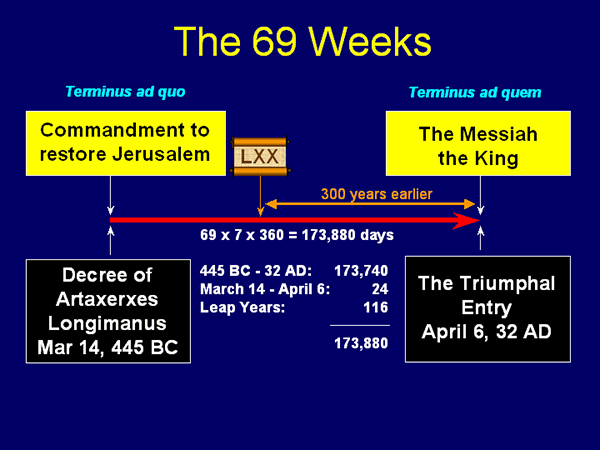The Unexpected King
 Rejoice greatly, daughter of Zion; cry out, daughter of Jerusalem! Look! Your king is coming to you. He is righteous, and he is able to save. He is humble, and is riding on a colt, the foal of a donkey. (Zechariah 9:9 ISV)
Rejoice greatly, daughter of Zion; cry out, daughter of Jerusalem! Look! Your king is coming to you. He is righteous, and he is able to save. He is humble, and is riding on a colt, the foal of a donkey. (Zechariah 9:9 ISV)
Next Sunday marks the feast of Palm Sunday for Christians around the world.
March 20 most churches will celebrate Palm Sunday, the Sunday before Easter. This event, also known as “the Triumphal Entry,” involves one of the most astonishing passages in the entire Bible.
Irrefutably Documented
To fully appreciate the remarkable significance of the following, it is essential to realize that the Book of Daniel, as part of the Old Testament, was translated into Greek before 270 B.C., several centuries before Christ was born. This is a well-established fact of secular history.
The Septuagint
After his conquest of the Babylonian Empire, Alexander the Great promoted the Greek language throughout the known world, and thus almost everyone — including the Jews — spoke Greek. Hebrew fell into disuse, being reserved primarily for ceremonial purposes (somewhat analogous to the use of Latin among Roman Catholics).
In order to make the Jewish Scriptures (what we call the Old Testament) available to the average Jewish reader, a project was undertaken under the sponsorship of Ptolemy II Philadelphus (285–246 B.C.) to translate the Hebrew Scriptures into Greek.
Seventy scholars were commissioned to complete this work and their result is known as the “Septuagint” (“70”) translation. (This is often abbreviated “LXX.”)
The Book of Daniel is actually one of the most authenticated books of the Old Testament, historically and archaeologically, but this is a convenient short-cut for our purposes here.
It is critical to realize that the Book of Daniel existed in documented form almost three centuries before Christ was born.
Gabriel’s Zinger
Daniel, originally deported as a teenager (now near the end of the Babylonian captivity), was reading in the Book of Jeremiah. He understood that the seventy years of servitude were almost over and he began to pray for his people.
The Angel Gabriel interrupted Daniel’s prayer and gave him a four-verse prophecy that is unquestionably the most remarkable passage in the entire Bible: Daniel 9:24–27.
These four verses include the following segments:
- 9:24 – The Scope of the entire prophecy;
- 9:25 – The 69 Weeks;
- 9:26 – An Interval between the 69th and 70th Week;
- 9:27 – The 70th Week.
The Scope
Seventy weeks have been decreed concerning your people and your holy city: to restrain transgression, to put an end to sin, to make atonement for lawlessness, to establish everlasting righteousness, to conclude vision and prophecy, and to anoint the Most Holy Place. (Daniel 9:24 ISV)
The idiom of a “week” of years was common in Israel as a “Sabbath for the land,” in which the land was to lie fallow every seventh year. It was their failure to obey these laws that led to God sending them into captivity under the Babylonians.
When did the Messiah present Himself as a King? On one specific day, Jesus arranges it!
Note that the focus of this passage is upon “thy people and upon thy holy city,” that is, upon Israel and Jerusalem. (It is not directed to the Church.) The scope of this prophecy includes a broad list of things which clearly have yet to be completed.
The First 69 Weeks
A very specific prediction occurs in verse 25:
So be informed and discern that seven weeks and 62 weeks will elapse from the issuance of the command to restore and rebuild Jerusalem until the anointed commander. The street will be rebuilt, along with the wall, though in troubled times.”(Daniel 9:25 ISV)
This includes a mathematical prophecy. The Jewish (and Babylonian) calendars used a 360-day year; 69 weeks of 360-day years totals 173,880 days.
 In effect, Gabriel told Daniel that the interval between the commandment to rebuild Jerusalem until the presentation of the Messiah as King would be 173,880 days.
In effect, Gabriel told Daniel that the interval between the commandment to rebuild Jerusalem until the presentation of the Messiah as King would be 173,880 days.
The “Messiah the Prince” in the King James translation is actually the Meshiach Nagid, “The Messiah the King.” (Nagid is first used of King Saul.)
Bull’s-eye!
The commandment to restore and build Jerusalem was given by Artaxerxes Longimanus March 14, 445, B.C. This was first identified in Sir Robert Anderson’s classic work, The Coming Prince, first published in 1894. (The emphasis in the verse on “the street” and “the wall” was to avoid confusion with other earlier mandates confined to rebuilding the Temple.)
But when did the Messiah present Himself as a King? During the ministry of Jesus Christ there were several occasions in which the people attempted to promote Him as king, but He carefully avoided it. “Mine hour is not yet come.”
The Triumphal Entry
Then one day He meticulously arranges it. On this particular day he rode into the city of Jerusalem riding on a donkey, deliberately fulfilling a prophecy by Zechariah that the Messiah would present Himself as king in just that way:
Rejoice greatly, daughter of Zion; cry out, daughter of Jerusalem! Look! Your king is coming to you. He is righteous, and he is able to save. He is humble, and is riding on a colt, the foal of a donkey. (Zechariah 9:9, ISV)
Whenever we might easily miss the significance of what was going on, the Pharisees come to our rescue. They felt that the overzealous crowd was blaspheming, proclaiming Jesus as the Messiah the King. However, Jesus endorsed it!
He replied, “I tell you, if they were quiet, the stones would cry out!” (Luke 19:40 ISV)
This is the only occasion that Jesus presented Himself as King. It occurred April 6, 32 A.D. (Luke 3:1: Tiberius appointed in 14 AD; 15th year, 29 AD; the 4th Passover occurred in 32 AD.)
The Precision of Prophecy
When we examine the period between March 14, 445 B.C. and April 6, 32 A.D., and correct for leap years, we discover that it is 173,880 days exactly, to the very day!
How could Daniel have known this in advance? How could anyone have contrived to have this detailed prediction documented over three centuries in advance? But there’s more.
The Interval
There appears to be a gap between the 69th week (verse 25) and the 70th week (verse 27):
Then after the 62 weeks, the anointed one will be cut off, and will have no successor. Then the people of the coming commander will destroy both the city and the Sanctuary. Its ending will come like a flood, and until the end there will be war, with desolations having been decreed. (Daniel 9:26 ISV)
The sixty-two “weeks” follow the initial seven, so verse 26 deals with events after 69th week, but before the 70th. These events include the Messiah being killed and the city and sanctuary being destroyed.
There is a remaining seven-year period to be fulfilled. Revelation 6–19 is essentially a detailing of that climactic period.
As Jesus approached the city on the donkey, He also predicted the destruction of Jerusalem:
Because the days will come when your enemies will build walls around you, surround you, and close you in on every side. They will level you to the ground—you and those who live within your city limits. They will not leave one stone on another within your walls, because you didn’t recognize the time when God came to help you. (Luke 19:43–44 ISV)
The Messiah was, of course, executed at the Crucifixion. “But not for Himself.”
The city and the sanctuary were destroyed 38 years later when the Roman legions under Titus Vespasian leveled the city of Jerusalem in 70 A.D., precisely as Daniel and Jesus had predicted.
In fact, as one carefully examines Jesus’ specific words, it appears that He held them accountable to know this astonishing prophecy in Daniel 9! “Because thou knewest not the time of thy visitation.”
The 70th Week
There is a remaining seven-year period to be fulfilled. This period is the most documented period in the entire Bible. The Book of Revelation, Chapters 6 through 19, is essentially a detailing of that climactic period.
The interval between the 69th and 70th week continues, but it is increasingly apparent that it may soon be over.
The more one is familiar with the numerous climactic themes of “end-time” prophecy, the more it seems that Daniel’s 70th Week is on our horizon.
Have you done your homework? Are you and your family prepared?
As you celebrate Palm Sunday this month, share with your family and friends this incredible demonstration of just who Jesus really was, and what the significance of all this is to all of us!
Amazing grace, indeed!
This article was originally published in the March 1996 Personal Update News Journal
© Copyright 1996-2016 Koinonia House
Source of Image: Koinonia House Via Bible Prophecy for Today